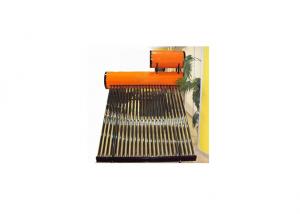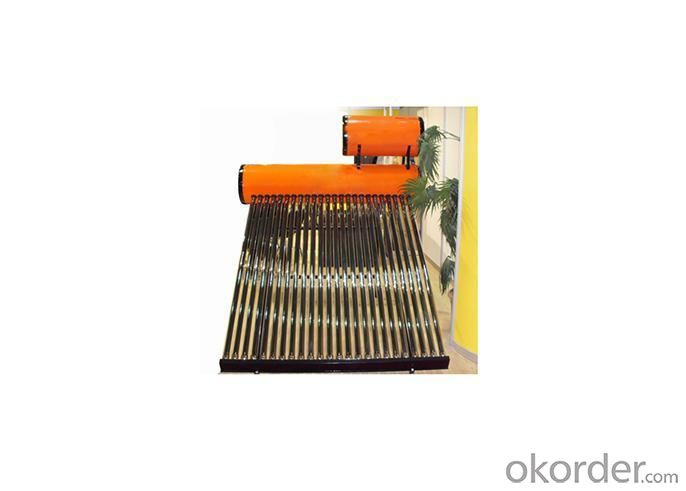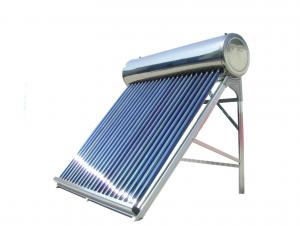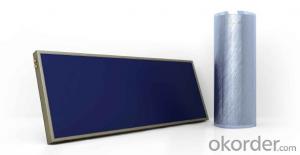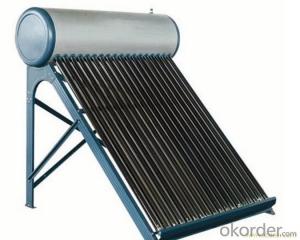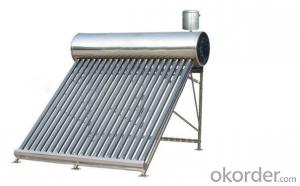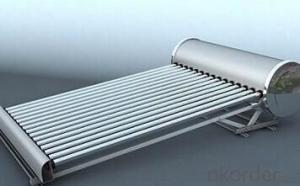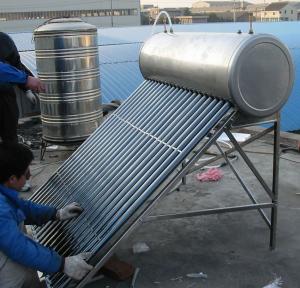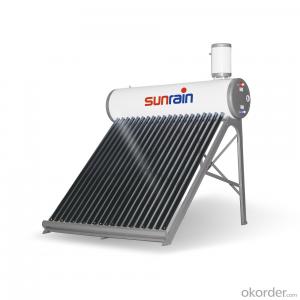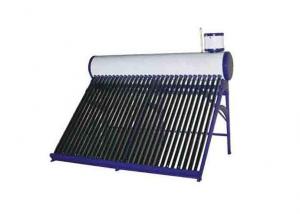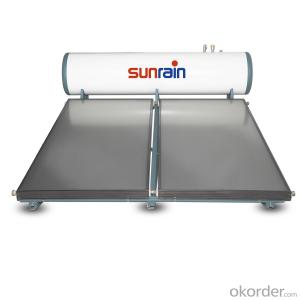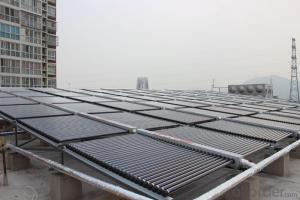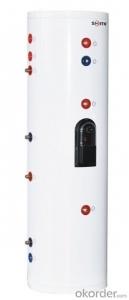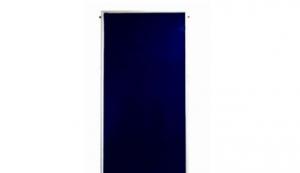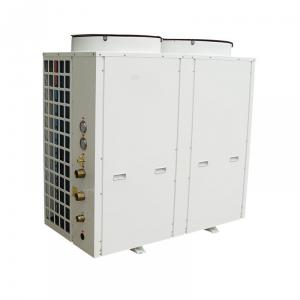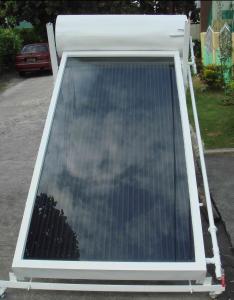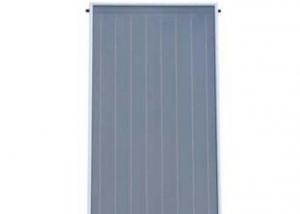Duda Double Water Tank Non-Pressurized Solar Water Heater
- Loading Port:
- China Main Port
- Payment Terms:
- TT or LC
- Min Order Qty:
- 1 Set set
- Supply Capability:
- 5000 Sets per Month set/month
OKorder Service Pledge
Quality Product, Order Online Tracking, Timely Delivery
OKorder Financial Service
Credit Rating, Credit Services, Credit Purchasing
You Might Also Like
Double water tank Non-pressurized solar water heater
even 1 pcs. paypal acceptable.
| Non-pressurized Solar Water Heater TECHNICAL DATA | |||||||
| WATER STORAGE TANKS SPECIFICATION | |||||||
| Material of out tank | High quality Painted steel/ Stainless steel. | ||||||
| Material of inner tank | Food grade SUS304-2B stainless steel. | ||||||
| Tank insulating layer | Imported polyurethane can conserve the heat for maximum 72 hours | ||||||
| Inlet and outlet hole | Male G 1/2 | ||||||
| Tank size | 420,460,470,475,480,500mm or Customer demand | ||||||
| Welding: | Argon arc welding | ||||||
| EVACUATED VACUUM TUBES SPECIFICATION | |||||||
| Tube structure | All-glass double deck co-axial structure | ||||||
| Glass material | High borosilicate 3.3 glass | ||||||
| Outer tube dia. & thickness | Ø58±0.7mm; Glass thickness 1.6±0.15mm | ||||||
| Inner tube dia.& thickness | Ø47±0.7mm; Glass thickness 1.6±0.15mm | ||||||
| Tube size | 58*1800mm | ||||||
| Absorptive coating property | Structure | AL/AL-ALN(H)/AL-ALN(L)/ALN or Cu/SS-ALN(H)/SS-ALN(L)/ALN | |||||
| Sediment method | Single target or Three targets - magnetron sputtering plating | ||||||
| Specific absorption | 0.90-0.93(AM1.5) / 0.93-0.96(AM1.5) | ||||||
| Emission ratio | 0.05-0.075(800C±50C) / 0.04-0.06(800C±50C) | ||||||
| Solar irradiation for obtaining a preset water temperature | Φ=58 H≤4.7MJ/m² | H=4.1-4.4MJ/m² / H=3.7-4.2MJ/m² | |||||
| Vacuum tightness | 5.0×10¯³ Pa | ||||||
| Idle sunning property parameters | 220-260 m².C/KW / 260-300 m².C/KW | ||||||
| Average heat loss coefficient | ULT=0.6~0.7W/(M2.0C) / ULT=0.4~0.6W/(M2.0C) | ||||||
| Resistant Hail | ≤25mm | ||||||
| Useful life | 15 years | ||||||
| BRACKET | |||||||
| Bracket: | Stronger galvanized steel / Stainless steel/aluminium alloy | ||||||
| Bracket angle: | 0,18,22,38,45 optional, pitched roof, flat roof optional. | ||||||
| Fastening pieces: | Made of zinc-coated stainless steel.. | ||||||
| MODEL No. | Tube Size | Tube No. | Tank Capacity | Aperture Area | Reommending for family | Load Qty 20GP/40HQ | |
| Dia.*L | ( m2) | (m3) | (sets) | ||||
| JXNP-58-10 | 58*1800mm | 10 | 100 | 0.93 | 2 | 77/184 | |
| JXNP-58-12 | 58*1800mm | 12 | 120 | 1.11 | 2 | 64/153 | |
| JXNP-58-15 | 58*1800mm | 15 | 150 | 1.39 | 3 | 52/123 | |
| JXNP-58-18 | 58*1800mm | 18 | 180 | 1.67 | 4 | 43/102 | |
| JXNP-58-20 | 58*1800mm | 20 | 200 | 1.86 | 5 | 39/92 | |
| JXNP-58-24 | 58*1800mm | 24 | 240 | 2.23 | 6 | 32/77 | |
| JXNP-58-30 | 58*1800mm | 30 | 300 | 2.79 | 7 | 26/61 | |
| JXNP-58-36 | 58*1800mm | 36 | 360 | 3.34 | 8 | 21/51 | |
- Q: Are there any financing options available for a solar water heater installation?
- Yes, there are various financing options available for a solar water heater installation. These options may include loans, leases, power purchase agreements (PPAs), and government incentives or rebates. It is advisable to research and consult with local financial institutions, solar companies, and regulatory bodies to determine the most suitable financing option for your specific circumstances.
- Q: Can a solar water heater be used with hard water?
- Yes, a solar water heater can be used with hard water. However, it is important to note that hard water may cause mineral deposits to build up over time, potentially reducing the efficiency and lifespan of the solar water heater. Regular maintenance and cleaning of the system can help mitigate these issues.
- Q: Can a solar water heater be integrated with existing plumbing systems?
- It is indeed possible to integrate a solar water heater with existing plumbing systems. In fact, it is quite common to retrofit solar water heaters into pre-existing homes or buildings. The usual procedure involves linking the solar collector panels to the existing water supply and return lines, as well as incorporating a heat exchanger or storage tank into the plumbing system. This enables the solar system to preheat the water prior to it entering the traditional water heater or to directly provide hot water to the fixtures, depending on the particular design. For a smooth integration and to optimize the efficiency of the solar water heater, it is crucial to have professional installation and make the necessary plumbing adjustments.
- Q: What is the expected energy savings from using a solar water heater?
- The expected energy savings from using a solar water heater can vary depending on various factors such as the location, size of the system, and hot water usage. However, on average, using a solar water heater can lead to energy savings of 50-80% compared to traditional water heating methods.
- Q: How does the altitude of a location affect the performance of a solar water heater?
- The performance of a solar water heater can be significantly influenced by the altitude of its location. As the altitude increases, the atmospheric pressure decreases, thereby impacting the boiling point of water. At higher altitudes, water boils at lower temperatures compared to sea level, which can cause a decrease in the efficiency of solar water heaters that rely on sunlight for water heating. Solar water heaters typically comprise solar collectors that absorb sunlight and convert it into heat energy. This heat energy is then transferred to the circulating water. However, at higher altitudes, the lower boiling point of water can cause premature boiling inside the collectors, resulting in the loss of thermal energy. Consequently, the overall efficiency of the system decreases, affecting its ability to effectively heat water. Furthermore, the colder temperatures often experienced at higher altitudes can further impact the performance of solar water heaters. Efficient heat transfer relies on the temperature difference between incoming cold water and heated water. If the ambient temperature is too low, the heat transfer process becomes less effective, thereby reducing the overall efficiency of the system. Additionally, the decreased atmospheric pressure at higher altitudes can affect the flow rate of water through the system. The reduced pressure results in slower water flow, hindering the heat transfer process and decreasing the system's performance. When installing a solar water heater at higher altitudes, it is crucial to consider these factors. Design modifications, such as incorporating heat exchangers or insulation materials, can help address the challenges posed by altitude and enhance the performance of solar water heaters in such locations.
- Q: How does the color of the solar panels affect the efficiency of a solar water heater?
- The color of solar panels does not significantly affect the efficiency of a solar water heater. The efficiency mainly depends on factors such as the design, size, and orientation of the panels, as well as the amount of sunlight received. The color of the panels may slightly influence their heat absorption capabilities, but it does not play a major role in overall efficiency.
- Q: How much space is required for installing a solar water heater?
- The space required for installing a solar water heater depends on various factors like the size and type of the system, the number of solar panels, and the available roof or ground space. Generally, a typical residential solar water heater requires around 20 to 40 square feet of roof space for installation. However, it is recommended to consult with a professional installer to assess your specific requirements and available space for an accurate estimation.
- Q: Are there any safety concerns with using a solar water heater?
- Yes, there are a few safety concerns with using a solar water heater. One major concern is the risk of overheating, which can result in scalding hot water and potential burns. Proper installation and maintenance, including the use of temperature and pressure relief valves, can help mitigate this risk. Additionally, there may be some electrical hazards associated with the system's components, so it is important to follow manufacturer guidelines and use a licensed professional for installation and repairs.
- Q: According to the installation of a solar water heater to the large area
- For more information please Baidu products and "river mall" view, the most complete solar air machine, and other accessories. Recommendation: "Dr. Sun" in the solar energy, solar (without water level sensor and solenoid valve)
- Q: Can a solar water heater be used in areas with limited access to suitable installation sites or roof space?
- Yes, a solar water heater can be used in areas with limited access to suitable installation sites or roof space. In such cases, alternative installation options such as ground-mounted solar water heaters or solar panels placed on walls or other structures can be considered. Additionally, compact or space-saving designs are available that can be installed in smaller areas.
Guided by business philosophy, our company has experienced success in the three historic periods, noted as brand building, diversification and globalization. It has long attached significance to innovation in satisfying the demands of worldwide consumers and realizing win-win performance between our company and our clients.
1. Manufacturer Overview
| Location | Zhejiang,China |
| Year Established | 2006 |
| Annual Output Value | |
| Main Markets | North America South America Eastern Europe Africa Oceania Mid East Western Europe Central America Domestic Market |
| Company Certifications | ISO9001:2008;CE;CCC |
2. Manufacturer Certificates
| a) Certification Name | |
| Range | |
| Reference | |
| Validity Period |
3. Manufacturer Capability
| a) Trade Capacity | |
| Nearest Port | SHANGHAI,NINGBO |
| Export Percentage | 71% - 80% |
| No.of Employees in Trade Department | 6-10 People |
| Language Spoken: | English, Chinese, Spanish, Portuguese, French, Russian |
| b) Factory Information | |
| Factory Size: | 5,000-10,000 square meters |
| No. of Production Lines | Above 10 |
| Contract Manufacturing | OEM Service Offered Design Service Offered Buyer Label Offered |
| Product Price Range | |
Send your message to us
Duda Double Water Tank Non-Pressurized Solar Water Heater
- Loading Port:
- China Main Port
- Payment Terms:
- TT or LC
- Min Order Qty:
- 1 Set set
- Supply Capability:
- 5000 Sets per Month set/month
OKorder Service Pledge
Quality Product, Order Online Tracking, Timely Delivery
OKorder Financial Service
Credit Rating, Credit Services, Credit Purchasing
Similar products
Hot products
Hot Searches
Related keywords
